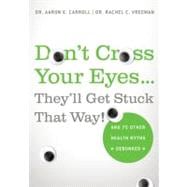
What is included with this book?
DR. AARON E. CARROLL is an associate professor of pediatrics in the Children’s Health Services Research Group at the Indiana University School of Medicine and director of the Center for Health Policy and Professionalism Research at the Indiana University School of Medicine.
DR. RACHEL C. VREEMAN is an assistant professor of pediatrics in the Children’s Health Services Research Group at the Indiana University School of Medicine and co-director of Pediatric Research for the Academic Model Providing Access to Healthcare (AMPATH).
Aaron and Rachel’s research has been featured in The New York Times, USA Today, The Los Angeles Times, Scientific American, Newsweek, and many other national publications. They have appeared on Good Morning America, The Colbert Report, CBS Evening News, and The Dr. Oz Show.
The New copy of this book will include any supplemental materials advertised. Please check the title of the book to determine if it should include any access cards, study guides, lab manuals, CDs, etc.
The Used, Rental and eBook copies of this book are not guaranteed to include any supplemental materials. Typically, only the book itself is included. This is true even if the title states it includes any access cards, study guides, lab manuals, CDs, etc.